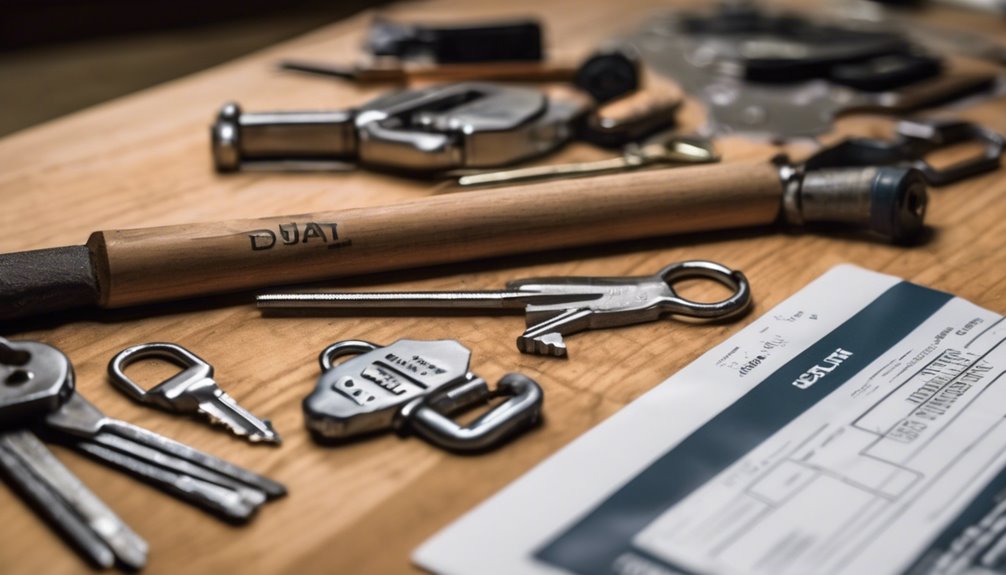If you’re considering becoming a locksmith in Utah, you’ll need to navigate a few essential steps. While the state doesn’t require a license, some cities like Provo do. Understanding the training options available and the necessary steps to start your own business is vital. Plus, knowing how to stay competitive in this field can make all the difference. So, what’s the first step you should take?
Key Takeaways
- Complete a formal locksmith training program or apprenticeship to gain essential skills and knowledge in the field.
- Check local regulations, such as Provo’s requirement for a city-issued license, to operate legally as a locksmith.
- Choose a business structure (sole proprietorship, LLC, etc.) and register your locksmith business with the Division of Corporations and Commercial Code.
- Invest in liability insurance and other relevant policies to protect your business from potential risks.
- Pursue specialized certifications and continuous education to enhance your skills and marketability in a competitive industry.
Licensing Requirements for Utah Locksmiths

When considering a career as a locksmith in Utah, it’s important to understand that while there’s no statewide licensing requirement, local municipalities may impose their own regulations.
For instance, if you’re planning to work in Provo, you’ll need a city-issued license to operate legally. You’ll also need to be at least 18 years old and have a clean ethical background.
While formal licensing isn’t mandatory, becoming a Certified Locksmith through recognized locksmith schools can boost your credibility in the locksmith industry.
Familiarizing yourself with local licensing requirements is essential, especially if you aim to work with local locksmith companies. This knowledge guarantees you comply with any applicable regulations and sets you on the path to success in your locksmith career.
Training and Apprenticeship Pathways
Aspiring locksmiths in Utah have several pathways to gain the training they need for a successful career. You can choose from formal Locksmith Training programs, like the American Center for Locksmith Training’s five-day course, or opt for flexible online courses.
Both options cover essential skills such as key duplication, lock picking, and installation of various locking mechanisms. However, consider an apprenticeship for hands-on training. Working under a licensed locksmith not only enhances your skills but also provides invaluable real-world experience.
If you aim to specialize, pursuing certifications like Certified Automotive Locksmith can further boost your marketability. With a low barrier to entry, starting your locksmith career can be both accessible and rewarding.
Steps to Launching Your Locksmith Business

Launching a locksmith business in Utah requires careful planning and execution to guarantee success. Here are the essential steps:
- Complete your training: Attend a training center or apprenticeship to become a locksmith.
- Choose a business structure: Decide if you’ll operate as a sole proprietorship, partnership, LLC, or corporation.
- Register your business: Make sure to register your business with the Division of Corporations and Commercial Code within 30 days.
- Invest in liability insurance: Protect your locksmith business with general liability and theft insurance.
- Build your online presence: Develop a professional website and engage on social media to attract clients.
Salary Expectations for Locksmiths in Utah
Although salary expectations for locksmiths in Utah may be lower than the national average, they still offer a viable income for skilled professionals.
The mean annual salary for locksmiths in Utah is approximately $43,160, translating to about $20.77 per hour. Your salary can vary based on experience, specialization, and location, with urban areas typically offering higher rates.
The mean annual salary for locksmiths in Utah is around $43,160, with urban areas generally offering higher rates.
Taking locksmith courses and becoming a certified general locksmith can enhance your earning potential considerably. As a licensed locksmith, you’ll find that certifications and advanced training play an essential role in your locksmith career.
While top-paying states may offer higher salaries, Utah provides a solid foundation for those committed to their trade.
Recommended Insurance Types for Locksmiths

As a locksmith in Utah, having the right insurance coverage is vital for protecting your business.
You’ll want to look into essential options like general liability and errors and omissions coverage to safeguard against various risks.
Consulting with insurance professionals can help you find the best policies tailored to your specific needs.
Essential Coverage Types
When you start your locksmith business in Utah, it’s important to secure the right types of insurance coverage to protect yourself and your assets.
Here are some important coverage types to evaluate:
- General liability insurance: Protects against claims for property damage or bodily injury while providing services.
- Theft insurance: Mitigates risks of loss from stolen tools or equipment on the job.
- Errors and omissions coverage: Safeguards you from claims of negligence or failure to deliver promised services.
- Business property insurance: Covers your tools and equipment against damage and loss.
- Continuing education: Investing in your skills can reduce risks and enhance your credibility.
Having the right insurance not only protects you but also builds trust with your clients as a locksmith in Utah.
Consult Insurance Professionals
Consulting with insurance professionals is a smart move for locksmiths in Utah who want to guarantee they’ve the right coverage. By consulting with an insurance agent, you can tailor your policies to fit your specific business needs and comply with local regulations.
General liability insurance is essential for protecting against claims of property damage or injury while you work. Additionally, theft insurance is advisable to cover losses of tools and equipment. Errors and omissions coverage will safeguard you from claims arising due to mistakes or negligence in your services.
Remember to regularly review and update your insurance policies as your business grows, ensuring you maintain adequate protection against evolving risks.
Staying Competitive in the Locksmith Industry
To stay competitive in the locksmith industry, you need to prioritize continuous skill development and embrace new technology.
Specialized training opportunities can set you apart and allow you to offer unique services that command higher rates.
Continuous Skill Development
Staying competitive in the locksmith industry requires continuous skill development, and it’s crucial to prioritize ongoing education.
By enhancing your skills, you’ll meet evolving customer needs and command higher rates. Here are some effective ways to invest in your education:
- Enroll in specialized courses, like an automotive locksmith course.
- Attend workshops at the Center For Locksmith to learn about new security systems.
- Engage in alumni chat groups and online forums for knowledge sharing.
- Stay updated on the latest lock-picking techniques.
- Gain hands-on experience through real-world practice.
Incorporating these various methods into your routine will guarantee you’re always improving your expertise, helping you thrive in this dynamic field.
Embrace Technology Advancements
As you focus on continuous skill development, embracing technology advancements is just as essential for your success in the locksmith industry. Staying competitive means investing in advanced training and specialized equipment. This improves your locksmith service, especially if you target niche areas like automotive locksmiths or electronic security.
Here’s a quick overview of key technology advancements:
| Technology | Benefits |
|---|---|
| Mobile Scheduling Apps | Improves efficiency |
| Electronic Locks | Expands service options |
| Advanced Lock Picking | Enhances skill set |
| Security System Certs | Increases marketability |
| Online Forums | Provides ongoing support |
Specialized Training Opportunities
While the locksmith industry evolves rapidly, specialized training opportunities can set you apart from the competition. By pursuing targeted education, you can enhance your skills and increase your marketability.
The American Center for Locksmith Training offers courses that focus on:
- Automotive locksmithing techniques
- Safe and vault servicing
- BMW/Mercedes programming
- 2-day Eeprom course for chip programming
- Specialized certifications in niche areas
These specialized trainings not only improve your skills but also allow you to command higher rates and respond to increased demand in specific markets.
Staying current with workshops and certification programs guarantees you’re informed about the latest advancements in the locksmith trade, keeping you competitive and relevant in this dynamic field.
Frequently Asked Questions
Do Locksmiths Make Good Money?
You might think locksmiths don’t make good money, but that’s not entirely true.
While the average salary is lower in some states, the earning potential can increase considerably with specialization and experience.
For instance, investing in training for automotive or electronic locksmithing can lead to higher rates.
Many locksmiths miss out on maximizing their income due to insufficient training or tools, so focusing on your skills can really pay off in this field.
How Long Does It Take to Learn to Be a Locksmith?
Learning to be a locksmith can take anywhere from a few months to two years, depending on your chosen path.
If you opt for formal training, it might only take 5 days to a few months.
Apprenticeships offer hands-on experience and usually last 1-2 years.
Online courses provide flexibility and can be completed at your own pace, typically taking several weeks to months.
Your commitment will greatly influence how quickly you become proficient.
Do I Need a License to Be a Locksmith?
Do you really need a license to be a locksmith? In many places, including Utah, there’s no statewide requirement for a license.
However, local regulations can differ, so you should check if your city mandates a license. If you’re not using your legal name for business, you’ll need to register it.
Is It Worth Training to Be a Locksmith?
Yes, it’s definitely worth training to be a locksmith. Investing in quality training can pay off quickly, with many recovering costs after just a few jobs.
Hands-on programs often yield higher success rates than online courses, and skilled locksmiths are in demand. You’ll gain essential skills and certifications, boosting your credibility.
With a mean salary of $47,810, training opens up lucrative opportunities in the locksmith trade, making it a smart career choice.








